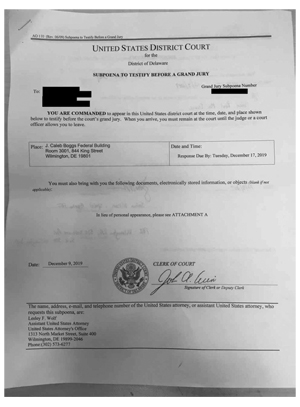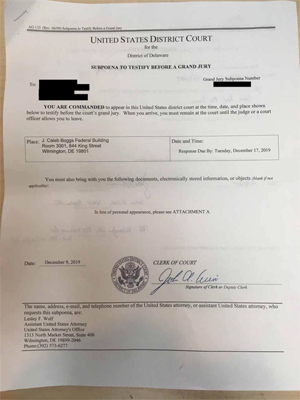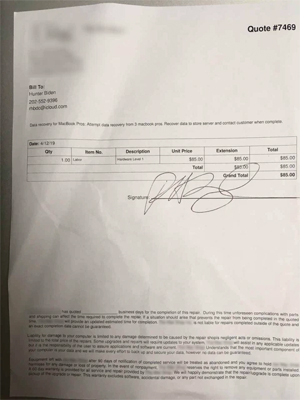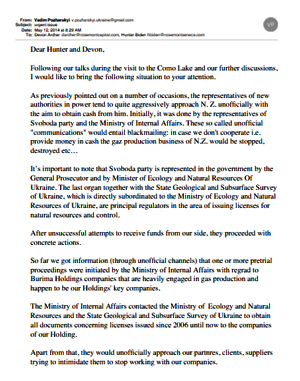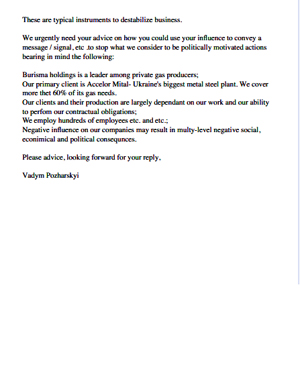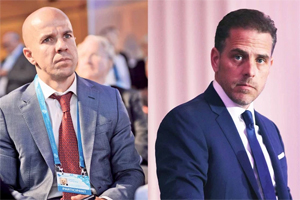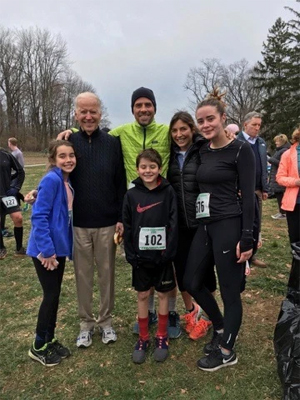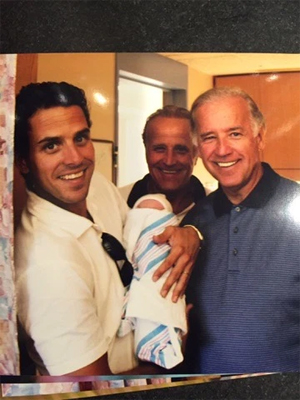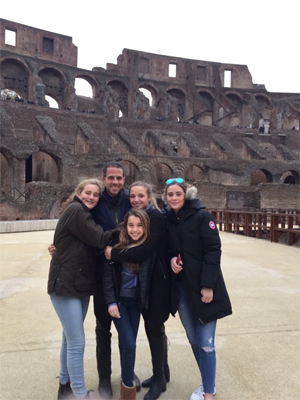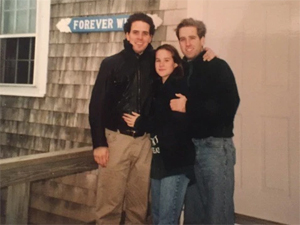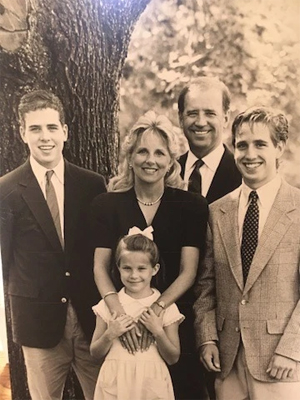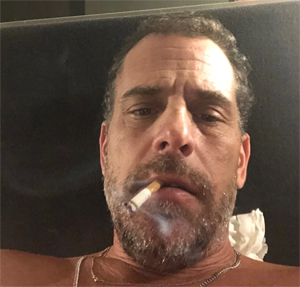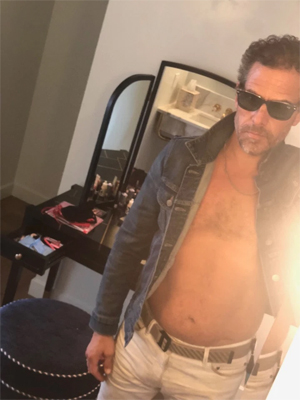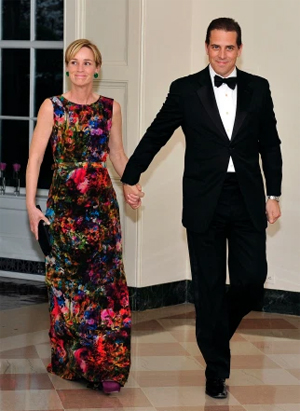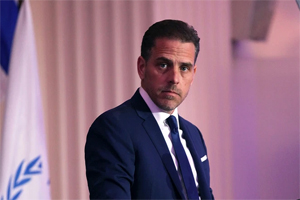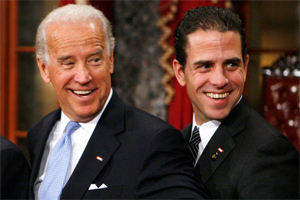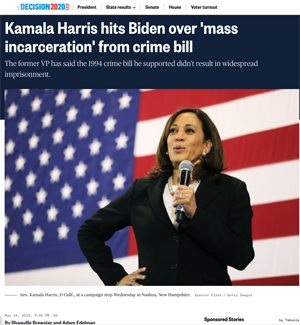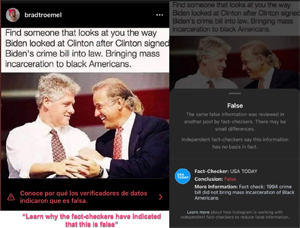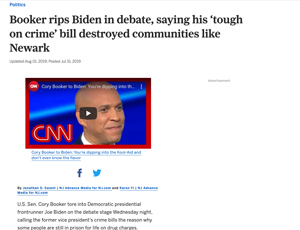“The Work Continues”: Cornel West & Maria Hinojosa on the Promise & Dangers of the Biden Adminby Amy Goodman
DemocracyNow!
JANUARY 21, 2021
https://www.democracynow.org/2021/1/21/ ... josa_bidenNOTICE: THIS WORK MAY BE PROTECTED BY COPYRIGHTYOU ARE REQUIRED TO READ
THE COPYRIGHT NOTICE AT THIS LINK BEFORE YOU READ THE FOLLOWING WORK, THAT IS AVAILABLE SOLELY FOR PRIVATE STUDY, SCHOLARSHIP OR RESEARCH PURSUANT TO 17 U.S.C. SECTION 107 AND 108. IN THE EVENT THAT THE LIBRARY DETERMINES THAT UNLAWFUL COPYING OF THIS WORK HAS OCCURRED, THE LIBRARY HAS THE RIGHT TO BLOCK THE I.P. ADDRESS AT WHICH THE UNLAWFUL COPYING APPEARED TO HAVE OCCURRED. THANK YOU FOR RESPECTING THE RIGHTS OF COPYRIGHT OWNERS.
We host a wide-ranging discussion of the historic inauguration of President Joe Biden and Kamala Harris — the first-ever woman, South Asian and Black vice president — how we got here, and what comes next, with award-winning journalist Maria Hinojosa and author and Harvard professor Cornel West. Hinojosa says she had “mixed emotions” watching the inauguration, her sense of hope tempered by memories of the Obama administration. “We all had these extraordinary expectations, and then things didn’t turn out that way,” she says. “The work continues.” West says that while getting Trump out of office was vital, he is still suspicious “of the capitulation to the neoliberal greed and lies and hatred, now that we’ve pushed back the neofascist forms of greed and lies and hatred.” On his first day in office, President Biden ended many of the Trump administration’s anti-immigrant policies. Hinojosa says parts of this agenda are promising, but lack urgency. “In eight years, there could be a new administration. Everybody knows that,” she says. “Do you understand that if you were to do massive immigration reform right now … what that would do to boost the American economy across the board?”
Transcript
This is a rush transcript. Copy may not be in its final form.
AMY GOODMAN: For more on these actions of the Biden administration, on the overall inauguration and Inauguration Day itself, and what comes next, not to mention what came before, we’re joined by two guests.
Dr. Cornel West is with us, professor of the practice of public philosophy at Harvard University, author of many books, including Race Matters and Black Prophetic Fire. His new podcast is called The Tight Rope.
And Maria Hinojosa joins us, award-winning journalist and author of the new memoir, Once I Was You. She’s founder of Futuro Media, host of Latino USA and co-host of the podcast In the Thick.
We welcome you both back to Democracy Now! Maria Hinojosa, let’s begin with you. If you can talk about what we watched yesterday, from — and later in the day, the executive orders, a number of them dealing with immigration, not to mention a not exactly perfectly formed immigration plan, or defined, but some outlines of it, but also the swearing in of the first woman vice president, first Caribbean American, Indian American, African American vice president, daughter of Oakland, by Sonia Sotomayor, the first Latinx Supreme Court justice?
MARIA HINOJOSA: Yeah, it was pretty mind-blowing to see that moment, Amy. And it’s great to be here with you and with Cornel on — you know, on a new day, really, when we’re saying that it really is a new day. And I’m so thrilled to be here with you and your audience and Dr. West to talk about all of this.
Now, like you, there were a lot of mixed emotions. I mean, I was getting very emotional, which I was catching myself, because I had that level of emotion — of course, we all did — when Barack Obama was elected and brought into office, and we all had these extraordinary expectations, and then things didn’t turn out that way. So everything was just kind of like, “Oh my god, this is so beautiful! Oh my god, the United States of America! Oh my god, we’re back!” And then it was just like, “Wow! What just happened?”
My husband kept on saying to me, “It was by a hair.” He just looked at me at one point, and he said — he just went like this. By this much, we didn’t lose this democracy. And so, that is real. I mean, they were coming to murder people. This was an attempted coup d’état in the United States, and the entire world saw it.
On the other hand, we are breathing more freely as journalists. We knew that what we could be facing was an even more targeted assault on us. As a journalist who’s Mexican, an immigrant, not born in this country, I didn’t know what was going to come next for me. Like that.
At the same time, Kamala is vice president. This is incredible. This is extraordinary. Dr. Jill Biden continued working in community colleges.
So, you know, it was here in my household. My daughter, you know, who I was just like, “Aren’t you emotional?” And she was like — and she very much active in electoral politics for the first time ever in her life at 22. But she just kept on saying, “I don’t want people to just walk away now. I don’t want people to just think it’s all good.” And so, the work continues. La luta continúa.
NERMEEN SHAIKH: And, Dr. Cornel West, if you could respond to what happened yesterday at the inauguration, and your sense of what this new administration might hold?
CORNEL WEST: Well, again, I’m just blessed any time to be with you, my dear sister, and Sister Amy, Sister Maria.
But I was just thinking about this fundamental pattern of American history, where 200,000 Black soldiers had to join the Union Army, break the back of white supremacist slavery, Black freedom movement in the '60s, break the back of white supremacist apartheid. Here again, you've got Black folk coming to keep us going off the neofascist cliff with the gangster Trump. And yet, at the same time, Black folk often, in the end, end up recrucified, especially Black poor, especially Black working class.
This is a point I think that Sister Maria was making about the disappointment, that there’s a rot in the system. And the rot is corporate greed and Pentagon militarism. And no matter how many people of color you sprinkle around, even in high places, if they can’t reshift that trajectory of the empire, then, in fact, you end up with a deep, deep disappointment, you see?
So, it is a new day. I’m so glad we stopped the neofascist threat. I want to thank Aimee Allison with She the People. I want to thank Stacey Abrams, of course, with Fair Fight; Refuse Fascism with Sister Sunsara and Brother Andy — and, actually, I was part of that myself as a co-initiator. But it’s not just mixed emotions, but I’m just now suspicious of the capitulation to the neoliberal greed and lies and hatred, now that we’ve pushed back the neofascist forms of greed and lies and hatred. And so, the issue of poor people, the issue of working people, that’s going to be the crucial thing for me.
And when you look at Biden, you know, you say, “OK, the old Biden is tied to three crimes against humanity”: the invasion and occupation of [Iraq], mass incarceration, especially for young Black and Brown brothers and sisters, and then you’ve got the Wall Street greed unleashed. And we haven’t even got to the vicious Israeli occupation. All of those, Biden, the old Biden, fundamentally tied to, used to brag about each and every one of them. We’ll see whether there’s a new Biden. I want to be open. You know, I’m a person of hope. But I wasn’t born at night, maybe — last night. I wasn’t born last night. Let me put it that way. I was born at night, but not last night. We’re going to see.
NERMEEN SHAIKH: Dr. West, I’d like to ask you about comments that you made in a recent interview, saying that, effectively, there’s no democracy left in America because of the nihilism in the country, the various forms of nihilism. And you talk about the fact that the 74 million people who voted for Trump, of which a slim majority were both women and men, white women and men, but also one out of three Asians, one out of three Jews, more than one out of three Latinos, and even one out of five Black men. So, could you say a little bit more about that, the range of people who voted for Trump? And there are 74 million of them. What should happen to them? What will happen to them under this new administration? How should they be dealt with or engaged?
CORNEL WEST: I think part of the problem, though, my dear sister, is that with the corporate duopoly of the two parties — so, you’ve got the Republican Party, you’ve got the Democratic Party, both of them tied to corporate greed, both of them tied to Pentagon militarism, and all of the criminality that goes with that, the drones and so forth and so on — that the deep desperation, along with the deep suffering of people, forces them to have to choose between the two.
So, when neoliberal policies come along and you get all the rationalizers of globalization that don’t say a mumbling word about inequality, don’t say a mumbling word about mass incarceration and so forth, that they say, “OK, let’s try the Democrats.” Then, boom, 1% walks off with most of the wealth. “Let’s try populism.” Well, the populism was much more right-wing than left-wing. Many of us with Bernie tried left-wing. The neoliberals crushed us, unfairly, in many ways. So they try the alternative. Here comes Trump, the neofascist pied piper. What happened? They still get crushed.
How do poor and working people ever get their voices heard? And we know. You know, you’ve got social scientists like Brother Dylan and others who say that the voices of ordinary people are not heard. Seventy-two percent of American citizens want Medicare for All. Biden, the exemplar of empathy and common humanity and compassion, he says he’ll veto that bill in the middle of a pandemic. That doesn’t look like too much empathy for me at all.
What are we talking about here? As long as you’ve got a system with this rot — the neoliberal form of the rot, the neofascist form of the rot — we’ve got to have much more either left populist, much more radical, or we’re going to be right back where we were four years ago, because the neoliberal policy of the old Biden won’t work. But I’m giving the new Biden a chance. He might be FDR. We’ll see. He’s got to be bold. We’ll see. I’m not holding my breath, but we shall see. History has a mystery to it.
AMY GOODMAN: Former President Donald Trump did not attend the Biden-Harris inauguration, but three of his predecessors did: Presidents Bill Clinton, George W. Bush and Barack Obama. They filmed a video message to President Biden Wednesday while standing in the Memorial Amphitheater at the Arlington National Cemetery.
BARACK OBAMA: Obviously, there was a personal element to see my former vice president become the 46th president, to see Kamala Harris as our first woman vice president. But, more broadly, I think inaugurations signal a tradition of a peaceful transfer of power that is over two centuries old.
GEORGE W. BUSH: Well, I think the fact that the three of us are standing here talking about a peaceful transfer of power speaks to the institutional integrity of our country.
BILL CLINTON: So, this is an unusual thing. We are both trying to come back to normalcy, deal with totally abnormal challenges, and do what we do best, which is try to make a more perfect union. It’s an exciting time.
AMY GOODMAN: So, I want to put this question each of you. That was President Clinton, before that, George W. Bush, and starting with President Obama. On the one hand, this sense that the country is returning to normalcy, to a bipartisan consensus, but you look at the men — you look at George W. Bush, responsible for how many deaths, invading Afghanistan and then Iraq; you look at President Clinton, the welfare, so-called, reform bill that led to the impoverishment of so many and mass incarceration, which, of course, Joe Biden was very much a part of; and then President Obama, called by his closest immigrant rights allies the “deporter-in-chief.” Now, on the other hand, you have this slew of executive orders on the first day. As they were recording this, you had President Biden signing off on the executive orders. And the executive orders include fortifying DACA. They include, at least for now, halting border wall construction. They approve reversing the travel ban on Muslim-majority countries and undoing Trump’s expansion of immigration enforcement within the U.S. If you can talk about this, what a return to so-called normalcy means, and if at this point, at this kind of breaking point in American history, does there need to be a break? And I’d like to put that question to both of you, starting with professor Cornel West.
CORNEL WEST: Well, no, when I see those three brothers, they’re tied to crimes against humanity — there’s no doubt about that — from drones dropped on innocent people, from a Wall Street greed that crushes poor people and actually kills them concretely and symbolically, when you look at the role that the occupations and invasions have played both — not just abroad, but even here at home, military occupations in our cities. You see? So that anytime you’re head of an empire, no matter what color, no matter what — either Democrat or Republican, you’re head of an empire, you’re going to be tied to crimes against humanity.
And I refuse to normalize that. You know, I refuse to just look at Bill Clinton and say nothing about a vicious, vicious crime bill and a withdrawal of resources for people who are hungry. You see, just morally and spiritually, that is — that’s wrong. And Obama dropping these drones and bailing out Wall Street rather than working people, and killing, assassinating American citizens with no no due process at all, and he walks around like he’s some grand progressive. Please, get off the crack pipe. We’ve got to tell the truth. The truth is bigger than all of us. Bush, we won’t even get into, in terms of the Iraq War and so on, and the lies and so forth.
This is what we don’t hear on corporate media. Thank God for Democracy Now! That God for what you all do, because we can’t normalize this kind of mistreatment of our fellow human beings. So it doesn’t make any difference what color they are. We’re going to check with Sister Harris and see whether she falls right in step. There’s a good chance she will. Then we have to be critical.
AMY GOODMAN: And Maria Hinojosa?
MARIA HINOJOSA: Look, yes to all of that. I mean, for me, everything that — well, let me just start with the three presidents, because I’m right with you. I think that — that is what America is. America is that country that forgets willingly. We were all alive. We covered what happened with Gore v. Bush and the Supreme Court deciding who was going to be president. That is not a democracy. You know, in my book, Once I Was You, everybody is so just kind of — their minds are blown, because it turns out, yes, it was Bill Clinton, in fact, who started building the wall. It was Bill Clinton who in fact signed all of those laws that led to where we are now, where people can be put into detention, prison-like conditions, simply not being born in this country. So, and George W. Bush, please, the largest liar, por favor. Colin Powell, we lived through this, the lies.
But, on the other hand, I actually disagree with professor, my brother, Cornel West in this. I don’t believe that democracy is dead yet. And I think this is the tricky part, right? Because, for example, more Latinos came out to vote than we have ever seen before. And this was extraordinarily important because they are the second-largest voting bloc in the United States of America. So, the fact that I’m here talking about this is really important, because the other side of the Latino coin for the last, what, 50 years is our invisibility, right? Which ties into what Dr. West was talking about, and this is where I completely agree with him.
The empire, which needs the militarization, which was built on mass incarceration, which is slowly being — slowly being deconstructed — slowly, OK, slowly — but what is it going to be replaced with? The immigration-industrial mass complex, that’s what it’s being. So, the immigration plan that Joe Biden said, it’s amazing that he is going to cut off the “Remain in Mexico” policy for refugees. But he said, “But if you’re there, you have to remain there now. You can’t move.” It’s like, what does this mean? We’re going to have immigration reform; it’s just going to take eight years. In eight years, there could be a new administration. Everybody knows that. Eight years?
So, I’m only hoping that what I want to see around me is more people understanding that democracy is not just about a vote. It is about everything. It is about Democracy Now! It’s about Cornel West and his professorship. It’s about the work that I do at Futuro Media, the books we write, the conversations we have. I’m a little bit in Trump territory here in Bethlehem, Connecticut, and I’m having to find my way to have these conversations with my neighbors. And I do that because that’s my job and because it’s my civic duty, because I chose to become an American citizen. So, all of this, for someone who chose to become an American citizen, oh, hell, yes, but who was also around when Nixon was the first one who I saw impeached. So, we’re not going away. And this fire, this fire that we have for this dynamic, this capacity to not all be on the same page, that is what democracy looks like. We need more of it.
NERMEEN SHAIKH: And I’d like to ask each of you — Maria, if you could begin — what do you think — now the Democrats are in control of the House and of the Senate. What do you think the priorities should be? And also, how can more progressive Democrats push the Biden-Harris administration to pursue policies that will differentiate this Democrat administration from the Obama one? Maria, if you could begin?
MARIA HINOJOSA: Yeah. Well, look, if you ask me — and I suppose I’m a little bit of a radical on this — what I would do, because, you know, we are much stronger than we think, that we’ve been able to live through this pandemic and staying home and not seeing anyone, not hugging people, not seeing our family, but I want it to stop. I would do a full shutdown. I would. And I would pay people. I would pay people. I would have checks going out so that people can be home, that we’re protecting the most essential workers, really, so that the economy and people can chill out and relax and not be freaking out at this point. And that takes care of COVID and the economy, I think, you know, inspiring the economy.
Immigration reform, you know, people see it as kind of an issue. Do you understand that if you were to do massive immigration reform right now — and I’m talking like in three years — what that would do to boost the American economy across the board? So, I kind of feel like the neoliberalism stops this administration from being what they think is going to be called radical. And what I say — and I know what both of you say, too — is, this is not radical. What is radical is taking the uterus from a woman simply because she was not born in this country. What’s radical is putting children in cages. What’s radical is a police officer murdering a Black man for doing nothing, while being captured on camera. That is radical. The solutions — and the question here for the Biden administration — we’re on the same page here — is: Can you change the narrative? Can you take accountability, apologize in a very big way, the both of them, so that we can begin to trust that there will be a deeper commitment to this real new day that we want to get to?
NERMEEN SHAIKH: And Dr. West?
CORNEL WEST: Indeed. Yeah, no, I’m with my dear Sister Maria. In fact, I would even go further in embracing Sister Maria here — and you tell me what you think, my sister — that, see, I would say, as long as there’s persons like all of us, as long as there’s artists like Yolanda Adams, as long as there’s poets like Sister Amanda and Gabrielle, her sister, and Joan, her mother, that democracy is alive in the hearts and minds of people. And as long as we’re willing to fight, as long as we’re willing to tell the truth, as long as we’re willing to hold onto integrity as opposed to superficial popularity, democracy is alive in the hearts and minds of people.
But it’s our structures that are profoundly anti-democratic. It’s the big money. It’s the lobbyists. It’s the Wall Street greed. It’s Big Tech greed. That’s what stands in the way. It’s the white supremacy and the male supremacy and so forth and so on, the hatred of gays and lesbians and trans and nonbinaries and so forth, so that, in that way, there’s always a struggle going on.
So, if I were asked what the Biden administration ought to do, they ought to look at the 14 points of the Poor People’s Campaign, that my dear Sister Theoharis and my dear Brother Barber, they lay it out — massive cuts in military, fundamental investment in schools, in housing, in jobs with a living wage, the empowerment of the trade union movement, the defense of rights and liberties.
And this is very, very important, you see, because when Bidens talk about — critiquing white supremacy is a beautiful thing. We’ve never had a president talk about white supremacy like that. Even Obama, with two inaugural speeches, never talked about white supremacy like that. But when he talks about domestic terrorists, the next thing you know, I’m a domestic terrorist, because I’m critical of Israeli occupation. If I’m critical of any form of Zionism by using the very term “Zionism,” that makes me an enemy of the state. So we have to be very clear that we’re not for massive repression and censorship and the defense of rights and liberties, even as we’re against white supremacy and male supremacy and any other ideology that leaves aside the humanity of people.
And this is going to be a very important challenge, but we must raise our voices no matter what, based in part on what the Poor People’s Campaign and other progressives are doing, not the fashionable, glitzy neoliberals who trot around as if they are progressives but in fact are in the hip pocket of Wall Street and corporate greedy elites and Big Tech elites and military militaristic elites. That’s going to be the challenge. And that’s the legacy of our dear brother this week, Martin Luther King Jr. That’s what is so powerful in the poetry of Sister Gorman and the music of Yolanda Adams, if we listen very closely and let it touch our souls.
AMY GOODMAN: Speaking of Martin Luther King and others, the new Oval Office decor has busts of Martin Luther King and César Chávez and Eleanor Roosevelt and Rosa Parks, among others, along with a portrait of FDR. We’re going to get final comments from Maria Hinojosa and Dr. Cornel West after break and after we play this remarkable five minutes during the inauguration, the youngest inaugural poet in U.S. history. Stay with us.
***
AMY GOODMAN: Twenty-two-year-old Amanda Gorman, the youngest inaugural poet in U.S. history.
This is Democracy Now!, as we end our conversation with Dr. Cornel West, professor of the practice of public philosophy at Harvard University, and award-winning journalist Maria Hinojosa. In the last few minutes we have, Professor West, you were in Charlottesville, Virginia, when the Klan marched, when the white supremacists marched. Amanda was writing her poem through the riot, the white supremacist attack on the Capitol. Your final thoughts?
CORNEL WEST: Just that we say to Brother Biden, you know, when he stood on the floor the Senate, November 18, 1993, and said, “These young Black folk are predators on the street beyond the pale, to be taken out of society,” if you’re going to talk about empathy, you ought to extend your empathy to the cousins of the brilliant, visionary poet Amanda on that street. They’re human beings, even when they’re incarcerated. Extend your sympathy to the immigrants trying to make their way, often coming into a country that used to be theirs, our Mexican brothers. Extend your sympathy to poor, no matter what color, working-class, no matter what color — yes, Jewish folk hated in France, Palestinians hated on the West Bank. Where is your concrete empathy and compassion and acknowledging common humanity?
That’s the kind of pressure that he’s going have to expect from love warriors, freedom fighters,, like both myself and the Amanda Gormans, with memories of Sojourner Truth and Harriet Tubman and Toni Morrison, and John Coltrane’s Love Supreme.
NERMEEN SHAIKH: And, Maria, your final thoughts?
MARIA HINOJOSA: Wow! Just also Frederick Douglass and Ida B. Wells, my founding fathers and founding mothers, right? That’s why we do this.
Look, the only thing that I — and I’m trying to stay inspired. I really am. Because, otherwise, what happens? So, we just have to realize that those of us who have this understanding of what democracy looks like got to deepen it. OK, sometimes you can chill. You’ve got to take a — you know, relax, whatever. I understand. But we deepen it. That’s why I love being on with both you, Amy, who I’ve known for years, and Brother West, is because there’s such a humanity here. And I think that if Joe Biden and Kamala can do something, it would be to actually try to humanize, as Cornel was saying, the brothers and sisters of our dear poet, of Amanda, of so many — right? — to humanize those who were not born here, like myself.
So, this is our challenge. As I tell my students — I’m about to start teaching any minute now at Barnard, and I’ll tell my students: There are some days when you cannot, in fact, be that unifier. So don’t try it on those days. On the days when you can have dialogue, yes. But you know what? At the same time now, maybe this isn’t a time for that right now. Give ourselves a little bit of a break also to take critical pause for what we’re seeing and to understand, finally, we are much stronger than we think. We never thought we could make it this far. But also, we did not all make it. We did not all make it. And so, for that, I’m very sorry.
But I’m looking at the sun, and I’m incredibly hopeful. Nature is what grounds me, and I hope it grounds the both of you, too — the three of you. It’s been such a pleasure to be with all of you.
AMY GOODMAN: We thank you so much for being here on this post-inauguration broadcast, Maria Hinojosa, award-winning journalist, author and professor, and Dr. Cornel West, professor of the practice of public philosophy at Harvard University.


